Kurnool, ANDHRA PRADESH / Bengaluru, KARNATAKA:
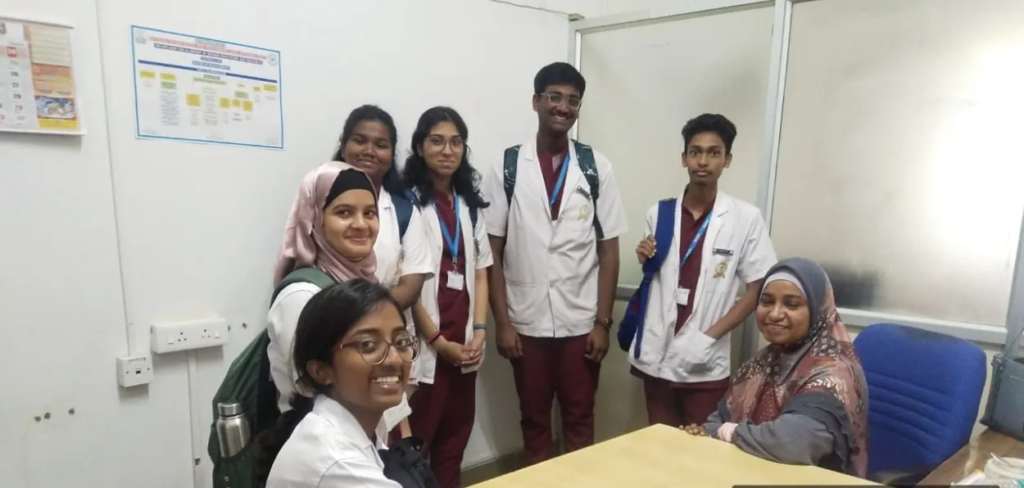
Dr. Azra Nalatwad’s forefathers were from a tiny town named Karnul in Andhra pradesh and had migrated to Karnataka. Behind her success of becoming a doctor is an incredible story of hard work and grit that lifted a poor family of weavers to a family of doctors. Dr Azra Nalatwad shared her and her parents’ inspirational story with Awaz-the Voice.
“My parents were extremely hardworking, poor, and struggled to make ends meet, particularly my father, Abdul Khader Karnu used to manually weave traditional saris through wooden looms, as machines had not yet arrived at that time. During his early 20s, after a lot of labour, he would make one saree.”
His family was living hand-to-mouth existence. Though Abdul Khader struggled with poverty, he dreamed big – he was determined to become a doctor. Without any prodding or help, he studied by himself while weaving sarees. Back then, there was no societal help, counselors, or family push to improve his lot. With sheer grit, he started to excel in his studies. He was so brilliant that he was sponsored for his studies in a boarding school. During holidays, he would return home and help with the business of his father and brothers.
“With great tenacity, he finally finished his studies to complete his MBBS and achieved his goal of becoming a doctor, specializing as an ENT physician. He was the first in the family to be so. Our father paved the way to help us all come up as a family.”
Her mother was a schoolteacher when she married Abdul Khader, who persuaded her to complete her MBBS and she became a gynecologist.
Dr. Azra who teaches anatomy at Karnataka Medical College says, “On seeing my parent’s hard work and toil, I resolved to study hard as well. Early in my school days, I wanted to become a doctor. So, I focused on getting admission to MBBS, which I managed to get in the area without going to a hostel to my relief.” Dr. Azra says that her life was made smooth due to the hard work of her parents.
Describing the life around her, she explains, “Around my neighbourhood, most of the girls would do some BST course, and then get married, but my parents spurred me on to do something significant and not hurry to get married. My parents always had a vision that we as a family should not just study and stay at home to be engrossed and wrapped up only in our lives but use our enlightenment to serve the community.”
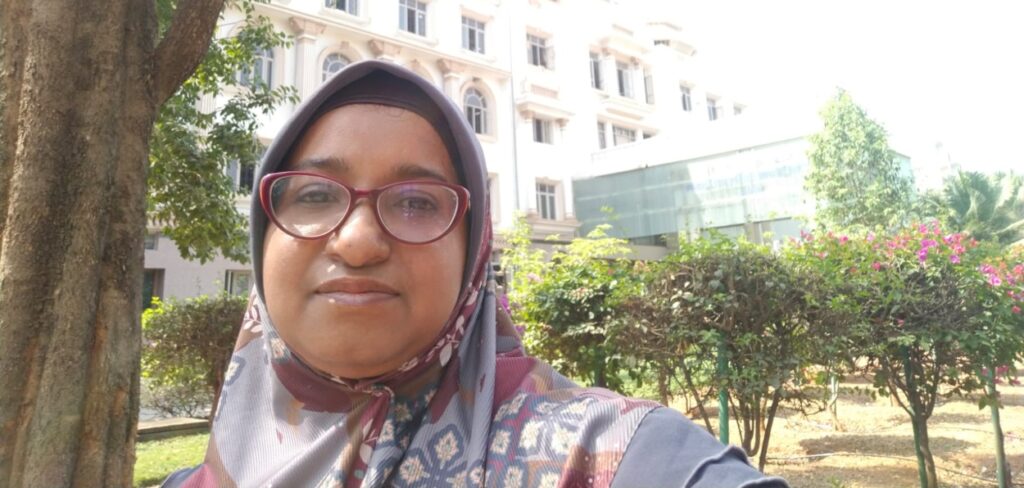
Dr Azra Nalatwad during her PG course
Azra’s family is a family of doctors. “My eldest sister is a dentist, her husband is a Pathologist (MD) and younger brother Dr. Adil is a neurosurgeon, his wife is a doctor with MBA and MBBS degrees.”
Interestingly, Azra’s husband is the only non-doctor in the family and it was deliberate. She explains: “When it was time for me to get married, my father told me that since there are many doctors in their family, it was better to find my prospective husband in another field. As a family, our conversations revolved around patients and their cases, so my father felt it would be better to get a non-medical groom.”
She married an engineer who working with one of India’s leading software companies.
To follow their father’s advice to his children that they must pay it back to society, Dr. Azra says, The siblings often organize free health checkup camps at Gulbarga.” (Gulbarga is now known as Kalaburagi and has developed to become a city).
She continued, “After writing my entrance test for the post-graduation, my father encouraged me to take the course wherever I get it. He taught me never to throw away opportunities. I was selected for anatomy and it took me to teaching. I did a course to learn ultrasound technology, and in the hospital where my mother was working, I was appointed as a sinologist.”
Dr. Azra Nalatwad’s father died during the COVID surge. “He continued to see patients even during the pandemic; never isolated them and eventually caught the virus and succumbed to it while during his duty in Gulbarga.”
Azra worked at different places like Kadapa in Andhra Pradesh, Ernakulam in Kerala and now she is in Bengaluru. Mother of two growing-up boys, she travels in her car from Bengaluru to Kolar daily for her anatomy teaching classes.
She explains, “I took up the teaching line in anatomy and was interested in ultrasound, so I went towards the clinical side for one and a half years, I also worked in Manipal Hospital as a senior resident doctor. Night duties in the hospital became problematic with my son as my mother-in-law was not there with me, so I quit that job and came back to teaching.”
She however loves her teaching job, “The new generation of doctors do not talk to their patients because of the long queues of people waiting to see them and they want to see as many patients as possible in a day, so impatiently, they quickly write something out for the patients and push them out to directly go for CT scans, ultrasounds without noting the signs and symptoms in the patient. There is no personal touch or caring. Once again, after their illness is diagnosed, they do not convey to the patient properly what was the problem and what steps to take, nor do they serve the patients their options. The doctors need to show them different modalities of treatment which and required them to communication properly.
“Therefore, I encourage my students to develop doctor-patient communication skills with more empathy and compassion, some emotional attachment is necessary. A patient needs to feel trust in a doctor to return to them. In the early days, a patient would only go back to their favourite doctor holding him in great esteem. These days it is sad to see patients changing the doctor midway during the treatment while complaining that the previous one was noncommittal and indifferent or even rude. These days, most of the doctors are cold and detached.
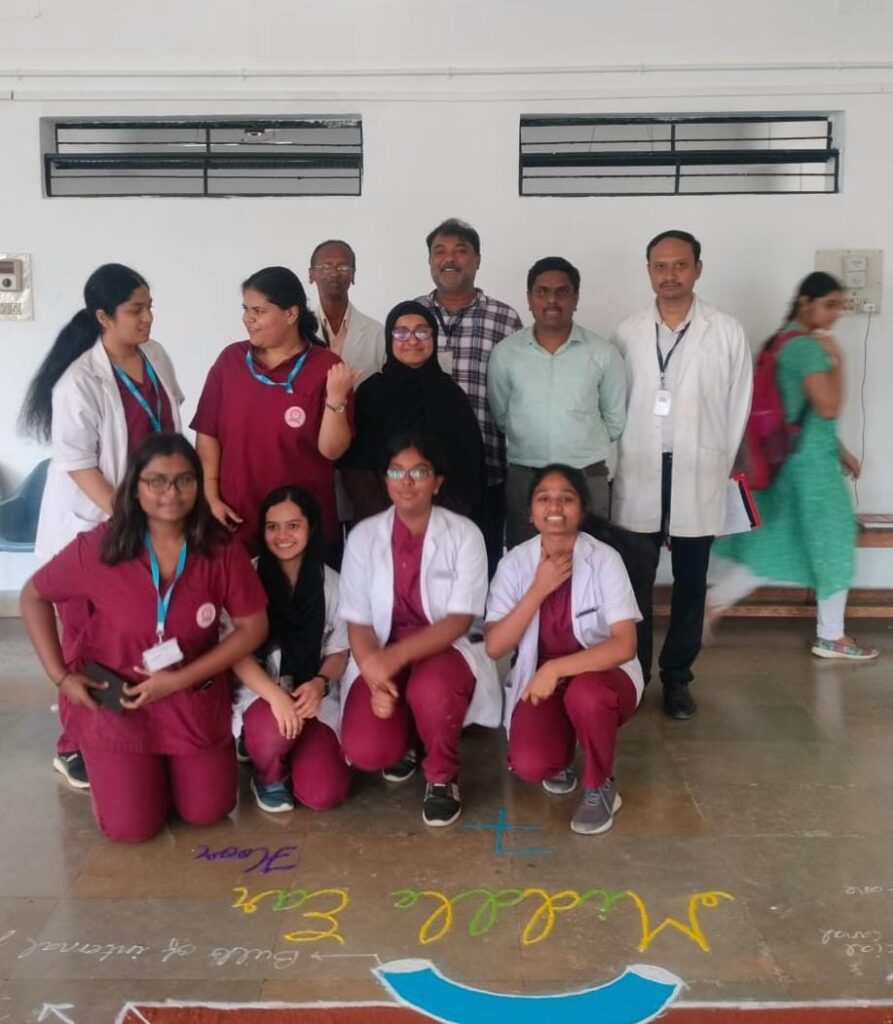
Dr Azra Nalatwad at the hospital (wearing a black Abayya)
She says her students are becoming aware of the bad doctor-patient cases as newspapers report about incidents of people assaulting doctors. “We guide them so that they will not learn through bitter experience but rather as we say, prevention is better than cure, so we teach them that when they are checking female patients, they need to take their consent and explain why they need to touch her body.”
I tell students, “You suddenly cannot ask her to lift her clothes without her consent, even if one is checking the wrist, the patient needs to be informed what the doctor is doing.” Thus, we teach our students to inform the patient before doing even a tiny procedure or even checking the pulse or temperature as a form of respect between the doctor and the patient and leave the lines open for good communication. Just directly touching the patient does not work nowadays. Teaching is a great responsibility where one does not just teach and go but has to inculcate empathy, sensitivity, communication skills, and other qualities in our students.”
Brightening up, she said, “One thing I am looking forward to is I am going to open my clinic very soon working as a family physician, serving my residents, and treating small illnesses, which do not require complicated procedures.”
She continued, “Why I want to start my clinic in Bengaluru is to ease the burden of the poor in a modest area. Nowadays, for simple sicknesses, people are going to big hospitals and get embroiled in unnecessary expenses and procedures. The OPD fees will be more than Rs. 500 or Rs. 750, an outrageous amount not required for small illnesses which is ripping the pockets of the poor. Things like a common upper respiratory tract infection, ear pain, or other little illnesses do not need an OPD visit but rather a small affordable clinic with a small fee such as Rs. 50 or Rs. 100 to make it very light and easy for them.”
She explained, “In big health centers, there is a lot of corruption going on where they hoodwink patients into paying large amounts of money for unnecessary tests, procedures, and treatment. I feel if I can help the poor in a smaller way such as this evading all the bribing that happens in big clinics and enabling health care at their doorsteps, figuratively. I want to ensure that they get immediate help and cure for their illness without running to mega hospitals to give large amounts of money which they cannot afford, to get treated.”
To pay tribute to the man who worked hard and changed his destiny, Dr Azra says she would name her hospital after her father. That she says would take a little time. Right now, besides taking care of her parents-in-law and husband, she has to look after her 12-year-old son and four-and-a-half-year-old daughter.
Rita Farhat Mukand is an independent writer
source: http://www.awazthevoice.in / Awaz, The Voice / Home> Stories / by Rita Farhat Mukund / May 14th, 2024
.
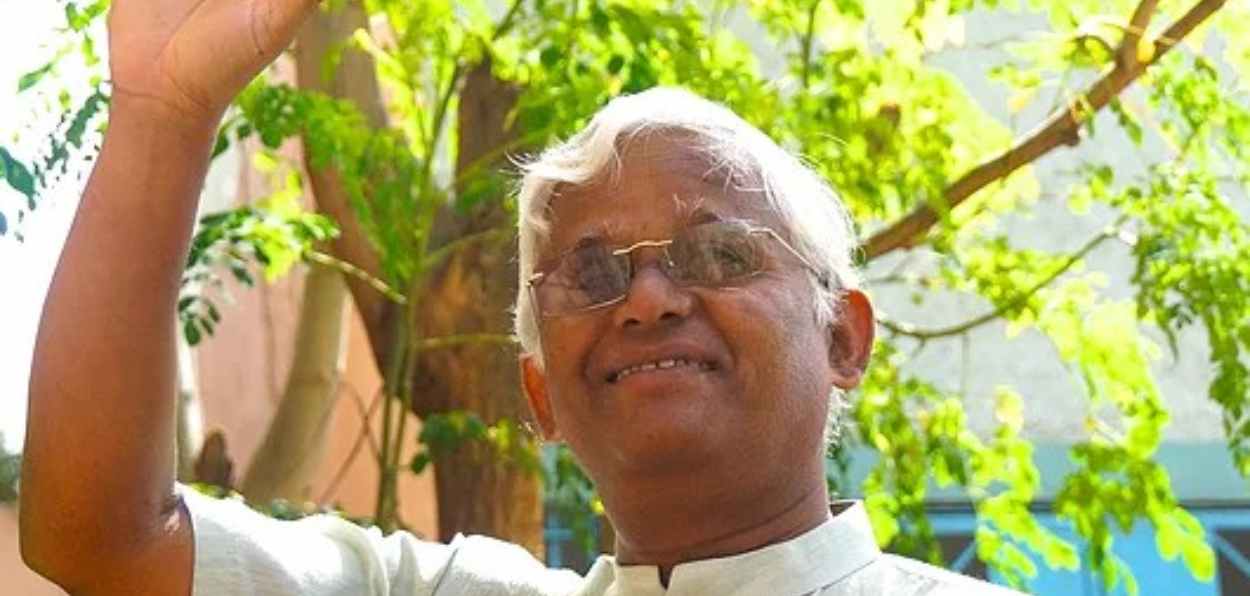
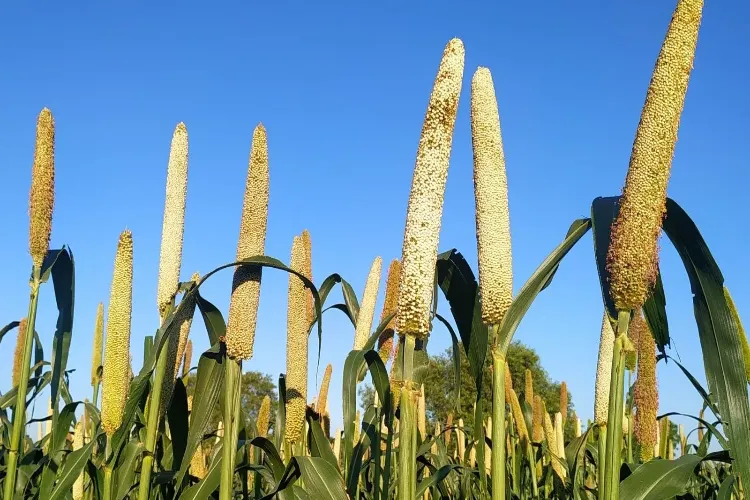
_(1).jpg)








